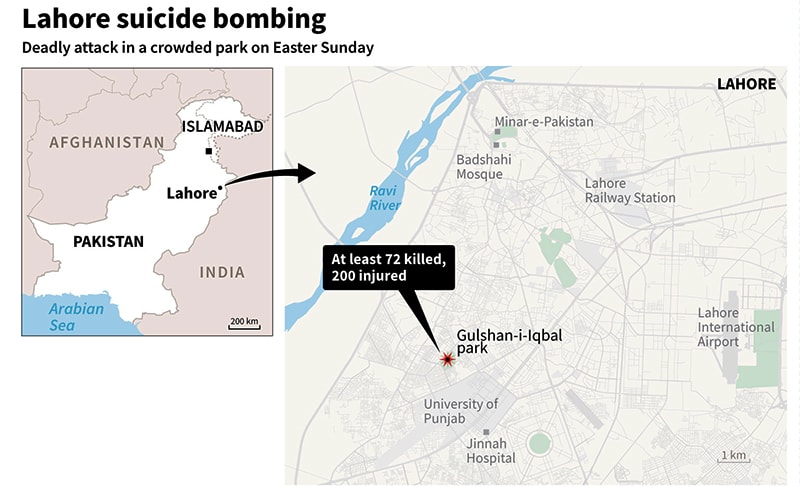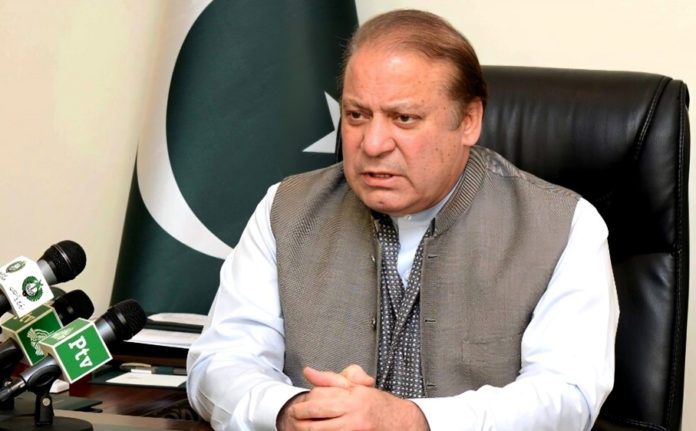On 27 March 2016, Pakistan was again ruthlessly attacked by terrorists at Gulshan Park, Lahore, to the horror of the Pakistani Nation. More than 72 men, women and children were killed and almost 300 injured in the bloody attack.
A nation that has been on a constant hit list for several years by terrorists again fell prey to the terrorism in the peaceful city of Lahore that has shown major progress in last few years and may be called as one of the fastest developing cities of Pakistan. The Chief Minister Punjab has been busy establishing battalions of security personnel by creating small group of Special Forces for making Lahore safe, unfortunately all this proved to be fruitless and shook the Lahoris of their confidence. Lahore is also home and headquarters for many political and religious parties of Pakistan. It is also the centre of film production, cultural activities and many more and it was common belief that Lahore is a safe place to live in. Other factors, Pakistan at this time is striving hard for its economic revival and diplomatic activities are increasing with a recent economic deal with China under China Pakistan Economic Corridor (CPEC) with special focus on Punjab. Neighbors have generated hope for Pakistan’s potential in addressing the militancy in this region, with continual success of operation Zarb-e-Azb. Pakistan’s image is improving in the comity of nations and is appreciated across the globe on local and international forums.
Terrorists are somehow removed not the terrorism, militants’ declines not militancy, unfortunately, the military operation and the government is unable to deal with changing mind-set across the board in Pakistan. The terrorists are after soft targets since past few years, from Jinnah Terminal to Army Public School (APS), Peshawar and recently Gulshan Park, Lahore, all lead us to conclude that militants are avoiding head to head confrontation with law enforcement agencies or the security agencies, fearing a severe backlash. The Armed forces recently handled these militants with an iron hand in Northern Pakistan and elsewhere.
Some events have also taken place recently that have added to the problem such as the hanging of Mumtaz Qadri (killer of former Governor Punjab, Salman Taseer), the passage of feminist bill, and some others social reforms that were widely criticized by religious groups. However, security experts believe that the attack on Gulshan Park in Lahore was not reactionary rather it was planned. The blast was widely condemned across the globe, in which a number of children and women were killed.
Security experts revealed that suicide bombers were changing methods and have adopted a new technique by tilting their faces towards the bomb thereby totally damaging their faces and their identity remaining a mystery. Pakistan’s support to the global war on terror (GWOT) and other social reformations have exposed Pakistan to such attacks but it is commendable that despite all odds, Pakistan armed forces and civil administration has been consistent in their fight against terrorism and have not taken a step back. Earlier, Karachi’s Jinnah Terminal and the Army Public School in Peshawar were the high-profile targets of these terrorists. It is important to identify the root causes of such attacks, the factors that have caused young suicide bombers (between 16-25 years) to give their lives so violently.
While the policy makers in Pakistan were focusing on building roads, stock markets, etc., they were unable to address the problems of poverty, better employment opportunities and education. The society has been a victim of stagnation, neither developing nor being revolutionized for changing the indoctrinated mindset that is the remains of the Cold War and the Afghan war. Pakistan was an active participant during Afghan war and later in the war against terror, being a friend and foe at the same time. Incidents of terror in Pakistan have not been bred in a day, there is history behind them and a common Pakistani is apprised of it. A day before the Lahore incident, former Pakistani Rock band artist turned businessmen turned religious preacher, Junaid Jamshed was attacked by some miscreants at the Islamabad Airport, for his alleged blasphemous comments.
On 25 March 2016, an Indian spy, Kulbhasan Jhadev was arrested in Balochistan, he confessed in the abetting and sourcing the terrorist activities in this province. He was arrested a few days back before the attacks, the investigation agencies are trying to find links, if any, with the Lahore blast.

The blast occurred on the Easter Sunday at Lahore where the Christian communities were enjoying a holiday, jam-packed at parks, however, rescue workers ruled out the possibility of targeted attack on Christians, as most of those who were killed and injured were from the Muslim community.
Soon after the blast, Afghan President Ashraf Ghani called the Pakistani Premier and offered condolences for those who died while condemning the cowardly act. In response the Prime Minister Nawaz Sharif reiterated that operation Zarb-e-Azb and National Action Plan would not be compromised and would continue unabated until the scourge of terrorism is eliminated from Pakistan. PM informed Mr. Ghani that the terrorists were on the run and were now targeting soft targets. Mr. Sharif also recalled that Afghanistan had also been going through same phase and had been a constant victim of terrorism and militancy. US President Barak Obama, British Prime Minister David Cameroon and Indian Premier Narendra Modi, besides many other prominent world leaders including UN Secretary General Ban-Ki Moon condemned the attack. The political leadership inside Pakistan widely condemned the Gulshan Park suicide attack and asked the government for stern action against the terrorists.
In a television address, the Prime Minister took the nation into confidence and informed his countrymen that a huge military operation against the terrorists in Punjab province has been planned in wake of the attacks for eliminating this menace and militancy. He said that the government is vigilant and no one can demoralize the entire nation by such cowardly attacks. PM Sharif directed the law enforcement agencies to step up counter-terror operations in Southern Punjab. It was envisaged by the Federal and Provincial Governments that in a due course of time southern Punjab would become a ‘safe heaven’ for the terrorists. While addressing a meeting at the Chief Minister House, Punjab, the PM conceded that there is a dire need for eliminating the extremist mind set which has became a constant threat to our way of life.
The Inter Services Public Relations (ISPR) chief, Lt. Gen. Asim Saleem Bajwa also informed the media that the intelligence agencies, Army and Rangers carried out search operation simultaneously at Lahore, Faisalabad and Multan. Chief of Army Staff, General Raheel Sharif also called on a meeting at the General Head Quarters (GHQ) and asked the intelligence and operational chiefs for immediate action against the perpetrators of the attacks.
Many religious parties have their headquarters in Lahore and a huge number of seminaries have been established across Punjab. Lahore has also become the hub for political activities where now the two major political parties i.e. the ruling PML-N and PTI are battling. Supremacy in Punjab virtually means supremacy in Pakistan politics considering that Punjab is still the dominating province on many counts other than its size.
What needs to be addressed today are the security concerns and concerted efforts are needed for the upgradation of society and the mindset. Consciousness at all levels needs to be developed. Pakistan itself is passing through a critical phase and it has adopted a low flight towards progress, and if, this is halted then it would be a very difficult task for policy makers to revive it. Luckily, the armed forces and the civil bureaucracy both are on board helping the political governments to drive Pakistan on the path to success for increasing diplomatic activity which would ultimately gave impetus to economic activity. Efforts are needed to eradicate poverty, unemployment and illiteracy for the elimination of extremism and frustration that leads to terrorism.




